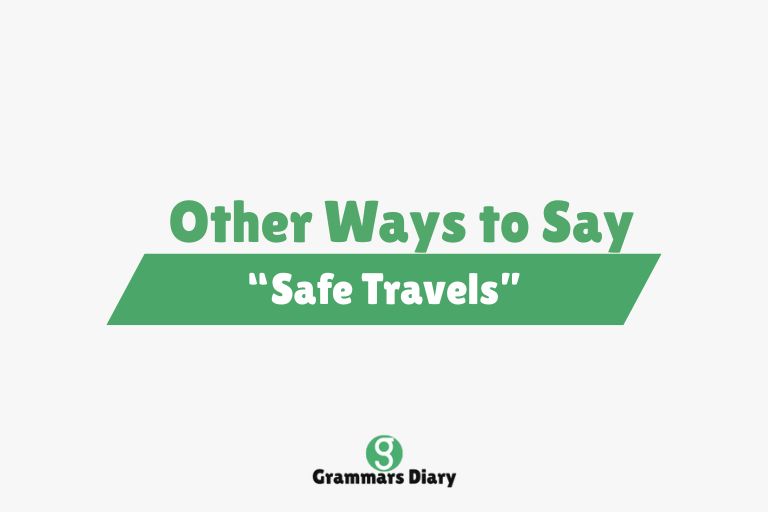“Safe travels” is a thoughtful and often-used phrase that expresses goodwill toward someone who is about to embark on a journey, whether it’s a short trip across town or a long flight across the world. For example, when you say, “Safe travels, see you soon,” you’re offering both a farewell and a hope that the person’s journey will be smooth and without harm.
While “safe travels” is clear and polite, there are many alternative expressions you can use to convey the same warm intention, each one adding a slightly different nuance depending on your relationship with the traveler, the tone you wish to strike, or the formality of the context. This article dives into a collection of such alternatives, offering a rich vocabulary to keep your farewells fresh, personal, and perfectly suited to the moment.
Other Ways to Say “Safe Travels”
1. Have a safe trip
Example: “Text me when you land, and have a safe trip.”
Meaning: This is a direct and slightly more informal version of “safe travels” that conveys a clear hope for a smooth and secure journey.
Usage: Commonly used in everyday conversations with friends, family, or colleagues when someone is heading out of town or traveling for work or pleasure.
2. Travel safely
Example: “Drive slow and travel safely, especially with the snow coming in.”
Meaning: This phrase puts emphasis on the traveler’s responsibility for their own safety, while still coming from a place of care and consideration.
Usage: Often used in spoken or written farewells when someone is traveling by car or in potentially challenging conditions.
3. Bon voyage
Example: “Bon voyage! Enjoy every moment of your European adventure.”
Meaning: Borrowed from French, this elegant expression literally means “good journey” and is often used to wish someone well on longer or more luxurious trips.
Usage: Ideal for formal cards, travel-themed parties, or elegant send-offs, especially when paired with a festive or celebratory tone.
4. Have a good flight
Example: “Have a good flight and let me know when you land.”
Meaning: A specific and direct farewell aimed at someone taking an airplane, expressing the hope that their flight experience is smooth and pleasant.
Usage: Most commonly used when you know the mode of travel is air-based, and you want to be both precise and kind.
5. Drive safe
Example: “Drive safe, and don’t forget to take breaks if you get tired.”
Meaning: A casual and conversational way of reminding someone to be cautious while on the road.
Usage: Perfect for local road trips or short drives, especially when speaking with family members or close friends.
6. Wishing you smooth travels
Example: “Wishing you smooth travels as you head into the mountains tomorrow.”
Meaning: This phrase offers not just safety but also ease, implying a hope that the trip goes without disruptions or delays.
Usage: Suitable for formal or semi-formal contexts where you want to sound thoughtful without being too casual.
7. Godspeed
Example: “You’ve got a long journey ahead—Godspeed, my friend.”
Meaning: A traditional, somewhat old-fashioned blessing that conveys a deep and sincere wish for success and safety on a journey.
Usage: Often used in dramatic, serious, or ceremonial contexts, such as farewells for long-term missions or life changes.
8. Safe journey
Example: “Safe journey! Text me if you need anything while you’re away.”
Meaning: A direct synonym for “safe travels,” used often in British English and conveying the same kind of goodwill and protective sentiment.
Usage: Interchangeable with “safe travels,” but may sound slightly more formal or poetic in tone.
9. Take care on the road
Example: “It’s supposed to rain later—take care on the road.”
Meaning: This phrase focuses on road safety and suggests caution, particularly when driving conditions might be less than ideal.
Usage: Used most often when someone is traveling by car, especially during bad weather or long drives.
10. Journey mercies
Example: “We’re praying for journey mercies as you head back home.”
Meaning: A common phrase in some religious or cultural communities, expressing both protection and blessings over the traveler.
Usage: Especially common in religious contexts or cultural traditions where prayers and well-wishes are emphasized.
11. Get there safe
Example: “Let me know when you get there—get there safe.”
Meaning: A casual, colloquial phrase that conveys care and affection, especially in more relaxed settings.
Usage: Best used among friends, siblings, or close relationships where informality is appreciated.
12. Watch out for traffic
Example: “The freeway’s been a mess lately—watch out for traffic.”
Meaning: Though it may not sound like a farewell, this phrase indirectly expresses concern for someone’s travel conditions and safety.
Usage: Often said as someone is leaving, and typically refers to city or highway travel.
13. May the road rise to meet you
Example: “As you head off to college, may the road rise to meet you.”
Meaning: This poetic blessing, derived from an old Irish saying, conveys the hope that a traveler’s journey is blessed and full of grace.
Usage: A beautiful and literary way to offer a heartfelt goodbye, especially in writing or ceremonial contexts.
14. Take it easy on the road
Example: “It’s a long drive—take it easy on the road, okay?”
Meaning: A soft, kind way of advising someone to avoid rushing and stay safe, especially while driving.
Usage: Casual and affectionate, often used with people you’re close to and care about.
15. Enjoy the ride
Example: “You’re heading through the mountains? Enjoy the ride—it’s a beautiful stretch of road.”
Meaning: This phrase encourages the traveler to not only stay safe but to find joy and appreciation in the journey itself.
Usage: Best suited for casual conversations, especially when the travel is scenic, leisurely, or vacation-related.
16. Hope you have a smooth journey
Example: “It’s a long train ride to Berlin—hope you have a smooth journey.”
Meaning: A polite and gentle wish that the traveler avoids difficulties or disruptions along the way.
Usage: Ideal for semi-formal or written communication, such as emails or cards.
17. Don’t forget to text when you get there
Example: “Be careful on the road and don’t forget to text when you get there.”
Meaning: A practical and caring phrase that emphasizes safety while also showing emotional concern.
Usage: Common in close relationships like parents, partners, or friends where checking in is expected.
18. All the best on your travels
Example: “All the best on your travels—can’t wait to hear about your adventures.”
Meaning: A positive and warm phrase that blends goodwill with an open-ended hope for success and joy.
Usage: Excellent for written notes, cards, or parting emails when someone’s leaving for an extended period.
19. Stay safe out there
Example: “Weather’s getting wild—stay safe out there, okay?”
Meaning: This expression places emphasis on personal safety in potentially risky conditions.
Usage: Frequently used when external conditions may pose a danger, such as inclement weather or unfamiliar territories.
20. Until we meet again
Example: “Farewell, my friend—until we meet again.”
Meaning: A poetic and heartfelt way to say goodbye, especially when the separation will be long or emotional.
Usage: Suited for meaningful farewells, particularly with close friends or loved ones.
21. Take care of yourself
Example: “I know you’ll be busy while traveling, so take care of yourself.”
Meaning: This expression encourages the traveler to be mindful of their well-being while away.
Usage: Widely used and versatile, this phrase fits well in almost any personal context.
22. Mind how you go
Example: “Lovely to see you—mind how you go.”
Meaning: A distinctly British way of wishing someone a safe and careful journey, often understated but affectionate.
Usage: Best used in UK-influenced regions or when trying to capture a quaint or regional tone.
23. Here’s to safe travels ahead
Example: “Raising a glass to you—here’s to safe travels ahead.”
Meaning: A celebratory and hopeful toast or blessing that blends well-wishing with festivity.
Usage: Perfect for send-off parties, farewell dinners, or any social setting where a toast is appropriate.
When to Use Different “Safe Travels” Alternatives
In Professional or Formal Settings
In situations where professionalism is essential—such as when a colleague is going on a business trip or a client is traveling—you might opt for polished and neutral phrases like “Have a safe trip”, “Wishing you smooth travels”, or “Hope you have a smooth journey”. These expressions communicate care without sounding overly familiar, which helps maintain respectful boundaries.
In Friendly or Casual Conversations
Among family members, partners, or friends, it’s natural to choose warmer, more relaxed phrases such as “Text me when you get there”, “Drive safe”, or “Take it easy on the road”. These alternatives offer emotional reassurance and often imply a personal connection or ongoing communication, such as checking in upon arrival.
In Travel-Related Contexts (e.g., Social Media, Cards)
When crafting a caption for a travel photo, writing in a greeting card, or posting a farewell message online, more poetic or expressive language like “Bon voyage”, “May the road rise to meet you”, or “Here’s to safe travels ahead” adds elegance and charm. These phrases often carry deeper sentiment and are perfect for longer journeys, celebrations, or big life moments.
Conclusion
The phrase “safe travels” has long served as a kind, simple way to send someone off with your best wishes. But as we’ve explored, there are dozens of equally thoughtful alternatives that can offer a bit more color, nuance, or personal touch depending on who you’re talking to and the context of their journey. Whether you’re saying goodbye in person, sending a quick text, or writing a heartfelt note, having a variety of expressions at your fingertips can make your words feel more meaningful and tailor-made.
For those looking to expand their vocabulary even further, websites like Thesaurus.com offer robust synonym lists that can help you find the perfect farewell for any occasion.
FAQs
What does “safe travels” mean?
“Safe travels” is a common expression used to wish someone a secure and uneventful journey, often spoken or written as a kind farewell.
Is “safe travels” formal or informal?
It can be used in both formal and informal settings. However, alternatives like “bon voyage” or “have a smooth journey” may be more suited to specific tones or audiences.
Is “travel safely” the same as “safe travels”?
While they express similar sentiments, “travel safely” puts more emphasis on the traveler’s actions, whereas “safe travels” is more passive and poetic.
When should I use a different phrase instead of “safe travels”?
If you want to match a more casual tone, show deeper care, or make your farewell more unique or expressive, choosing a specific alternative helps personalize your message.











